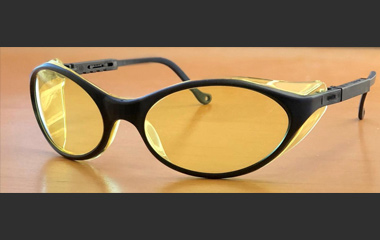Ninety percent of Americans use light-emitting electronic devices, such as smartphones and laptops, in the hour before bed, despite the fact that such behavior is associated with symptoms of insomnia. The obvious solution is to ditch the technology, but people rarely heed this advice.
Knowing that individuals with insomnia are also unlikely to change their ways, researchers from Columbia University Medical Center tested a method to reduce the adverse effects of evening ambient light exposure, while still allowing use of blue light-emitting devices. Their findings will be published in the January issue of Journal of Psychiatric Research. This research was supported by a Focused-Project Award from the American Academy of Sleep Medicine Foundation, a foundation of the American Academy of Sleep Medicine, and the NIH.
To learn more, read the press release and study.
Photo: The amber lenses used in the insomnia study block out a substantial portion of blue light but do not result in an overall dimming of the light levels reaching the eye. Orange lenses (not tested) may be more effective for improving sleep because they block out blue light almost completely and reduce the intensity, or brightness, of light. (Credit: Ari Shechter)






